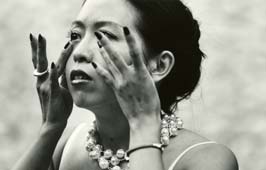
Wei Hui
- China
- Zu Gast beim ilb: 2006
Wei Hui was born in 1973 in Ningbo near Shanghai. In 1990 she was among the first students compelled to complete a full year of compulsory training at a military school, following the student unrests. It was at this time that she began to write. Wei Hui studied Chinese Language and Literature at Fudan University in Shanghai, graduating in 1995. Afterwards she worked in various professions, including as a journalist and a television editor.
Wei Hui belongs to the younger and more liberated generation of Chinese authors, who have proved controversial in breaking with the tradition of collectivism and state propagated moral dictates; not only do they unashamedly and comprehensively portray individuals oscillating between the desire for life and the fear of existence, but they also discuss sexuality openly.
The overriding compulsions of the protagonist in Wei Hui’s semi-autobiographical first novel »Shanghai baobei« (1999; Eng. »Shanghai Baby«, 2001) are inebriation and hedonism. »Every morning when I open my eyes I wonder what I can do to make myself famous. It’s become my ambition, almost my raison d’être, to burst upon the city like a firework. « The main character, an author, is torn between two men. As her sensitive Chinese boyfriend is unable to be physically intimate with her, she embarks on a passionate relationship with a German businessman. »Shanghai Baby« flirts with cultural stereotypes, plays with the theme of identity and illustrates the lifestyle of a new generation in an emboldened China, which is becoming attuned to Western standards as a result of increasing prosperity as well as unshackling itself from strict social taboos and precepts. The authorities found the novel provocative in the extreme and the author was labelled »decadent, debauched and a slave of foreign culture«. The work was banned, along with all four of Wei Hui’s collections of short stories which had previously been available. The publishing house was closed down for eight months, and 40,000 copies of the book were burned. Nevertheless, millions of copies were distributed illegally throughout China and the novel has also become an international bestseller, with translations in thirty-four languages. The film version of the novel is currently being produced and the project was presented this year in Cannes. The film is due to be shown in cinemas in 2007.
Wei Hui’s most recent novel »My Zen« (2005; Eng. »Marrying Buddha«, 2005) follows on from her first work. The story is set in Shanghai and New York, where the protagonist is again caught between two men; one American and the other Japanese. It seems that pop literature has received official approval in China between the publication of the two novels. After the author changed certain details, the four and a half year ban on her work was lifted, allowing the novel to be published in China. The book immediately found itself at the top of the bestsellers’ lists, and was translated into 14 languages. The author lives in Shanghai and New York.
© internationales literaturfestival berlin
Marrying Buddha
Ullstein
Berlin, 2005
[Ü: Susanne Hornfeck]
Shanghai Baby
Ullstein
Berlin, 2006
[Ü: Karin Hasselblatt]
